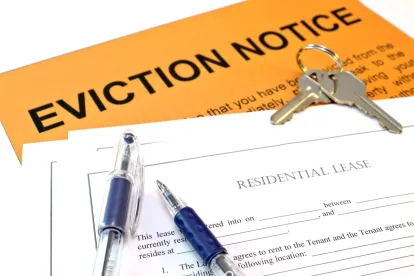On April 20, 2020, Massachusetts enacted a statewide moratorium on a broad swath of evictions and foreclosures during the COVID-19 state of emergency. A copy of the new law, adopted through House Bill No. 4647, is available here. The moratorium takes effect immediately and expires 120 days from April 20, 2020, or 45 days after the Governor rescinds the COVID-19 emergency declaration, whichever occurs first. However, language in H. 4647 permits the Governor to postpone the expiration date in increments of 90 days if the COVID-19 crisis continues.
The moratorium implemented through H. 4647 applies to all non-emergency evictions and foreclosures on occupied residential properties and certain small business premises unit properties throughout the Commonwealth in response to the Governor’s COVID-19 emergency declaration. Under H. 4647, a “small business premises unit” is defined as a business that does not meet any of the following tests: “(i) operates multi-state; (ii) operates multi-nationally; (iii) is publicly traded; or (iv) has not less than 150 full-time equivalent employees.” During the COVID-19 emergency, landlords are prohibited from terminating all such tenancies or sending notices to quit in cases of “non-essential evictions,” including evictions “(i) for non-payment of rent; (ii) resulting from a foreclosure; (iii) for no fault or cause; or (iv) for cause that [does] not” allege harm to the health and safety of others. Massachusetts courts are prohibited from accepting new complaints, entering judgments or default judgements, issuing executions or holding trials for any non-emergency eviction proceedings for residential properties or small businesses. Any deadlines for eviction proceedings affected by the ban are tolled until the expiration of H. 4647.
While H. 4647 does not relieve tenants from rent payment obligations that accrue during the COVID-19 state of emergency, landlords are prohibited from charging residential and small businesses late fees or reporting these tenants to consumer reporting agencies for missed rent payments, if within 30 days of the missed payment the tenant notifies the landlord that the rent was missed “due to a financial impact from COVID-19.” Landlords can sue to recover missed rent payments upon the expiration of H. 4647, and they are also allowed, upon notice to their tenants and in accordance with regulations to be issued by the Executive Office of Housing and Economic Development, to apply previously received last month’s rent amounts in advance to pay for certain qualified expenses, including, without limitation, mortgage payments, utilities, repair, and required upkeep.
Furthermore, creditors and mortgagees are prohibited from initiating foreclosure or sale proceedings for residential properties during H. 4647’s duration. Creditors and mortgagees are required to grant a forbearance of not longer than 180 days to mortgagors who submit sufficient notice of financial impact from COVID-19. During this forbearance, no fees, interest, or penalties can accrue on the missed mortgage payments. Again, H. 4647 does not relieve mortgagors from repayment of the mortgage payments missed during the forbearance period, and creditors and mortgagees can recover the missed payments upon the expiration of the forbearance period.
Helpful links





 />i
/>i

